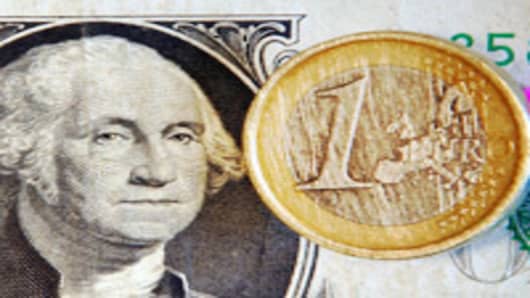When it comes to Europe, incremental and mealy mouthed haven’t worked. It’s time for big and bold.
Waiting for Europe to get its act together to solve its financial problems has become an even more insufferable drama than "Waiting for Godot." They keep talking but a financial solution never comes.
Former deputy Treasury Secretary Roger Altman, writing in today’ Washington Post, warned of a Euro-led global economic slump and said: “The reason markets are battering the euro zone is that its hesitant leaders have not developed the tools for countering such pressures.”
It’s time to change the narrative and for the United States to step up and abandon its policies of praising Europe’s incremental progress, gently prompting it to action and insisting that it be a Euro only solution.
Here, for example, is what a US Treasury official said yesterday: “We’re hoping to see accelerated European action over the next several weeks…”
Be still my beating heart.
It’s time for the US to express its dismay at the lack of progress and to begin corralling world resources to incentivize Europe to solve its problems
Several facts have led me to this conclusion:
- 1. Since the turn of the last century, Europe has never shown an ability to solve its problems without the United States.
- 2. Germany is economically the size of California, Texas and North Carolina. It cannot bail out Europe just as surely as those three states could not (and would not) bail out the United States.
- 3. The lack of trust in Germany among European countries means even if it could bail out Europe, it could never get political agreement for the necessary concessions.
- 4. Much needs to be done in Europe, but the focus for now needs to be on stability and the world should take a page out of the US response: Massive funds made available that never need to be used.
- 5. The US, despite its deficit problems, remains the only global power with the ability to rally the world toward a solution.
Collective action in times of panic is what governments are supposed to do. Be it response to a natural disaster like an earthquake or a financial crisis, governments should step up when the market or the individual can’t act.
Two years of sclerotic responses by Europe, culminating in the latest panic, should be enough evidence that Europe doesn’t have the political means to solve its problems, even while it does have the financial means.
As the TARP program showed (only when it comes to the banks) if you make enough money available quickly enough, you can stem the tide and it won’t cost you a penny.
So here’s a plan:
The US should lead the world in creating a large pot of money available to the Europeans to recapitalize their banks. A $2 or $3 trillion fund should get the market’s attention. Whatever the number, about one-third of this should come from the IMF.
Two-thirds should come from Europe. European money should be in the first loss position, that is, the IMF, as is always the case, should not suffer a dime of losses until all the European money is wiped out.
This money could be used as a sovereign rescue fund, to bail out sovereign institutions and for deposit insurance—all the programs that stanched the US panic. Whatever the use, it would not be available without a 2/3rd Europe portion and would be conditional—the way all IMF programs are—on European progress towards financial consolidation and fiscal union.
You can argue—and you would be correct—that this is Europe’s problem and they should pay for it. The place we are in now, however, is that we are all paying for it and waiting for European progress has proven a losing strategy.
Even when they take action, like the European Central Banks’ Long-Term Repo Operations—they bungle it by saying “there won’t be a third” convincing the shorts that there’s profit in betting against the central bank. The key to collective action is to dare the shorts to come at you and ensure that it’s at least two-way trade, if not a loser for the challenger. Fed Chief Ben Bernanke and then Treasury Secretary Hank Paulson fundamentally understood this.
While Altman said the world needs European leaders to step up, my point is that the world needs its leaders to step up. The US remains the global financial leader and the international community will not step up without US leadership.
That would mean US diplomacy to rally China and other emerging market countries to contribute (so far, we have been sort of indifferent). And that could mean commitment of additional US resources. I don’t think that commitment needs to be massive. There needs to be some symbolic amounts (we are already the largest fund contributor). But I believe it could be cost effective. It would assert US global leadership, and it could start a real process of solving Europe’s problems.
As for the domestic politics and a certain isolationist outcry, at this point, what’s the difference for President Obama? Europe, together with the anemic US recovery, already seems to be guaranteeing a one-term presidency. Asserting US economic leadership and financial commitment toward a European solution couldn’t make the financial situation much worse, and it just might make it better.



